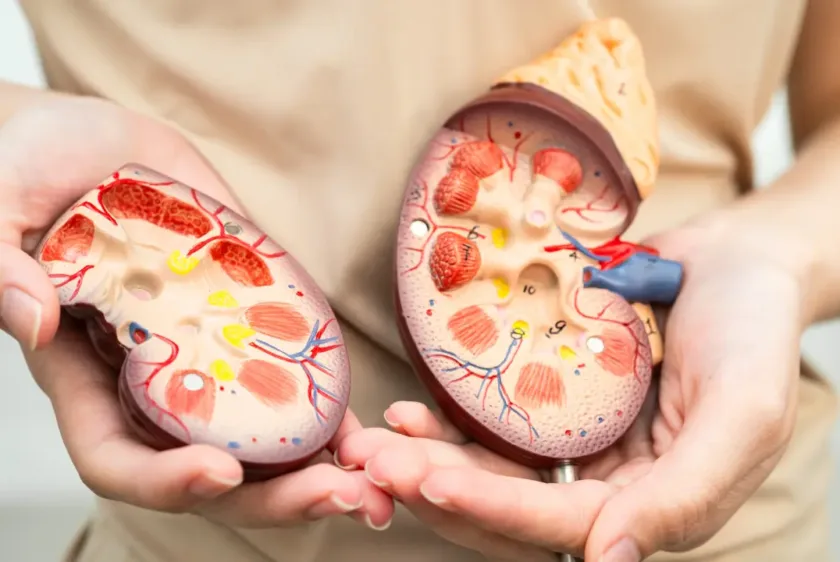Your kidneys quietly keep your body in balance — filtering waste, maintaining fluids, and protecting your overall health.
A Creatinine Test is one of the simplest yet most powerful ways to assess how well your kidneys are functioning.
In this guide, we’ll explain what the test is, why it’s important, what the results mean, and how to prepare for it.
What Is a Creatinine Test?
A Creatinine Test is a diagnostic procedure that measures the concentration of creatinine, which is a waste product generated from muscle metabolism, present in your blood. This test is crucial because your kidneys are responsible for filtering creatinine out of your bloodstream. When the levels of creatinine in your blood are elevated, it can indicate that your kidneys are not functioning optimally. This could be a sign of potential kidney issues, making the test an important tool for assessing kidney health and function.
| Parameter | Normal Range | Possible Indication |
|---|---|---|
| Creatinine (Men) | 0.7 – 1.3 mg/dL | Normal kidney function |
| Creatinine (Women) | 0.6 – 1.1 mg/dL | Normal kidney function |
| Creatinine (High) | Above 1.3 mg/dL | Possible kidney impairment |
Fact: Your creatinine level depends on your age, gender, muscle mass, and hydration. A qualified doctor should always interpret it.
Why Is the Creatinine Test Important?
The Creatinine Test detects early kidney issues
- Diabetes or high blood pressure
- A family history of kidney disease
- Swelling in the legs or feet
- Changes in urine output
- Fatigue or nausea without clear reason
Early detection saves lives. Kidney diseases often progress silently a timely Creatinine Test can prevent serious complications.
When Should You Get Tested?
Consider a Creatinine Test if:
- You are above 40 years old
- You have diabetes, hypertension, or heart disease
- You take regular painkillers or supplements that may affect kidneys
- You are receiving treatment that impacts kidney function, like chemotherapy.
For healthy adults, a yearly kidney function test is usually suggested.
How Is the Test Done?
The Creatinine Test is a straightforward and uncomplicated blood test that can be completed in just a few minutes. This quick procedure provides essential information about kidney function and health.
Steps:
- A small blood sample is collected from your vein.
- The sample is analyzed for creatinine levels.
- Your doctor might compare it to a Blood Urea Nitrogen (BUN) test.
They may compare it to an eGFR test for kidney function.
Understanding the Results
| Result Type | What It Means |
|---|---|
| Normal Range | Kidneys are filtering waste effectively. |
| Slightly Elevated | Could indicate dehydration, high protein intake, or early kidney stress. |
| High Creatinine | May signal reduced kidney function — further testing is advised. |
Tip: A single high result isn’t a concern. Your doctor will consider trends and other tests for an accurate diagnosis and treatment.
Creatinine Test vs. Kidney Function Test (RFT)
| Feature | Creatinine Test | Renal Function Test (RFT) |
|---|---|---|
| Purpose | Measures creatinine only | Measures creatinine + urea + electrolytes |
| Use Case | Routine screening | Detailed kidney health evaluation |
| Sample Type | Blood | Blood |
| Testing Time | ~5–10 minutes | ~10–15 minutes |
What People Say
“My doctor advised a Creatinine Test during a regular check-up. It helped detect an early kidney issue I’m glad I didn’t ignore it.”
— Zeeshan A., Islamabad
“I had no symptoms, but the test showed mild kidney stress. Simple lifestyle changes made a big difference.”
— Rabia K., Rawalpindi
FAQs About Creatinine Test
Q1. Is fasting required for a Creatinine Test?
Consult your doctor about fasting’s importance.
Q2. How long do results take?
Results are typically available within 24 hours.
Q3. Can dehydration increase creatinine levels?
Yes, temporary dehydration can cause a mild rise in creatinine.
Q4. What’s the difference between serum and urine creatinine tests?
A serum test checks blood levels; a urine creatinine test helps assess kidney clearance capacity.
Preventive Tips for Healthy Kidneys
- Stay hydrated drink enough water daily
- Control blood sugar and blood pressure
- Limit salt and processed foods
- Avoid unnecessary painkillers
- Get regular screening tests
Key Takeaway
A creatinine test offers important information about your kidney health. you can greatly improve your chances of preventing health issues and effectively addressing early signs of kidney problems. Consistent monitoring is key to maintaining your health.
Testing Locations Available
For accurate, certified, and internationally recognized testing, visit Nayab Labs & Diagnostic Centre, Islamabad.
We use advanced analyzers and follow ISO 15189:2022 and UKAS and PNAC standards. We ensure reliable and confidential results every time.
Location: Blue Area, Islamabad









